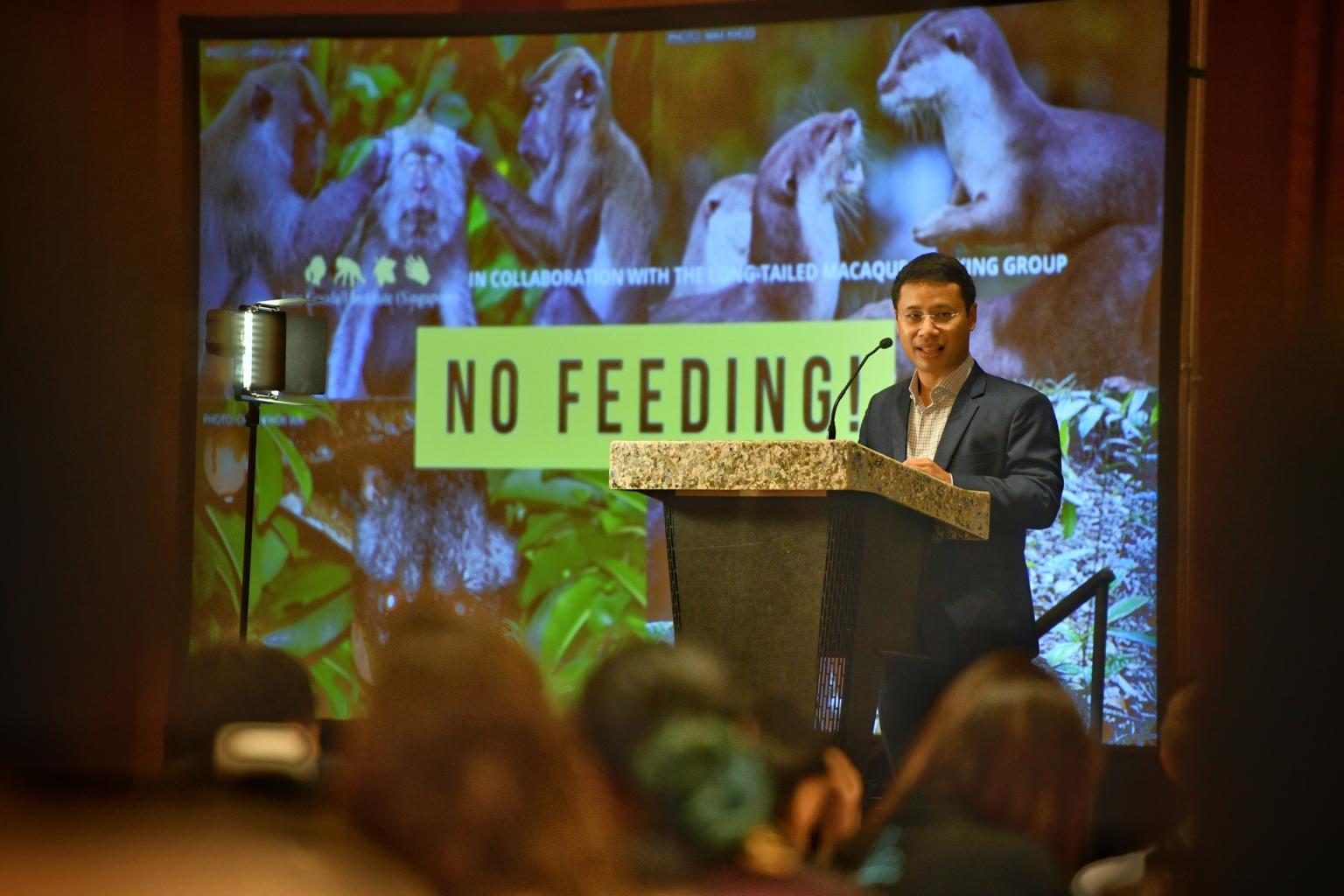Campaign launched to stop people from feeding long-tailed macaques
Sign up now: Get ST's newsletters delivered to your inbox

Minister for Social and Family Development Desmond Lee speaking at the Human-Wildlife Co-Existence in Asia: Conflicts and Mitigation Conference 2019.
ST PHOTO: CHONG JUN LIANG
SINGAPORE - There are now fewer cases of people feeding monkeys, but a new campaign has been launched to try to end such incidents completely.
The three-year-long "No Feeding" campaign focuses on the common long-tailed macaques and was launched on Tuesday (Nov 26) by the Jane Goodall Institute of Singapore (JGIS) and the Long-tailed Macaque Working Group, a volunteer working group.
There will be various initiatives such as nature walks, outreach talks, interviews with residents in macaque hot spots and teaching them safe monkey guarding procedures. Such procedures involve understanding monkey behaviour, and guiding them away from residential areas in a non-aggressive manner using walking sticks or umbrellas.
Macaque hot spots include residential areas around MacRitchie, Bukit Timah and Upper Thomson that are close to the forests.
The new campaign was announced by Minister for Social and Family Development Desmond Lee at the Human-Wildlife Co-Existence in Asia: Conflicts and Mitigation Conference 2019 at Marina Bay Sands Expo and Convention Centre. It was attended by conservationists, teachers, students, the public and media from the region.
He said: "Supported by data and feedback, outreach and education activities will be scaled up, and monkey guarding efforts will be carried out in more areas.
"More details will be shared in the coming months, as the plans continue to take shape, and get implemented."
Mr Lee also announced a three-year study that looks at the behaviour, movement, diet and health of the long-tailed macaques, which will be undertaken by National Parks Board (NParks) and the National University Singapore. The study will start in January 2020.
In his speech, Mr Lee outlined the initiatives Singapore has undertaken to protect wildlife as the country develops.
These include incorporating greenery into long-term planning, plans to restore secondary forests and expand species recovery efforts, and turning to nature-based solutions to deal with rising sea-levels and temperatures.
These include incorporating greenery into long-term planning, plans to restore secondary forests and expand species recovery efforts, and turning to nature-based solutions to deal with rising sea-levels and temperatures.
Renowned primatologist Jane Goodall also discussed the pressing issue of human-wildlife conflicts as human population grows and encroaches deeper into wildlife habitats, calling the "No Feeding" campaign "desperately important".
She said: "It's interesting to think of why we feed wildlife. There's some part of us that still relates closely to the animals that we share the planet with ... and that gives you a good warm feeling.

"So it's only through education that we gradually understand that by doing something that makes us feel so wonderful and part of the natural world, it's actually harming the animals and we have to stop doing it."
Dr Goodall, 85, in town for JGIS' inaugural ConservAction Week, will speak about conservation and attend programmes.
NParks attributed the drop in the number of monkey-feeding incidents to various educational measures it took, such as having outreach programmes, distributing advisory pamphlets and putting up signs in nature reserves and parks.
Engineer Kevin Kho, 58, a resident in Dairy Farm Estate, supports the monkey guarding effort and attended talks by JGIS in his condominium last year. He sees a troop of about 10 macaques at least once a week in the Upper Bukit Timah estate.
"Within Dairy Farm, we have been actively discouraging people from feeding but some people do it out of their good hearts. So it's tough to communicate to these residents that the monkeys need to feed off a natural food source to keep them from coming into the house."


